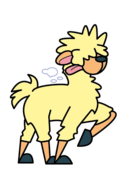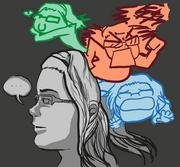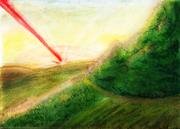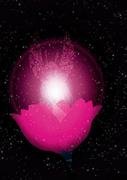How to abandon ARTBLOCK
This text will mostly focus on the aspect of creating visual art, however, maybe some of the points mentioned within, are useful to writers, musicians and other creative people as well.
Artblock. Probably every creative person has come upon it at least once in their life. As on artist you often strive for perfection, you want to make your vision become reality and you want to see your improvement immediatly, as soon as your pen touches the paper.
Now, everyone who ever tried drawing this one super amazing image they have in their mind, knows, how hard it is, to really get your vision down on paper (or computer) on point. The moment you start, the moment you set out to paint the next „Mona Lisa“, in that moment you already see after just one stroke, that this piece of art is absolute trash and you hate it with every fiber of your physical body.
How could you of all people have thought, that you could draw something this amazing? Then again, why not? You should be able to draw it, right? It's right there in your head. Maybe it is even right in front of you. And still, the proportions are off, the colors are awful, the composition is bollocks and why do you even bother finishing this?
Suddenly your vision fades, your idea becomes a blurry ugly mess, it wasn't worth to be realised in the first place and you decide to stop. A few days or weeks later you sit down again. You try to draw and there is... nothing.
You have no idea what to draw or how to draw. No matter how many circles appear on your paper sheet, the shapes don't seem to make sense, no matter what you look at in your room or on your phone, all you see is better art than your own and yet nothing inspires you to start drawing.
You are stuck.` And there is no way out.` You can't draw.` Drawing is impossible.`
You have an artblock.
Only when inspiration strikes again, maybe then you can start drawing again and be productive. Hopefully the next inspiration phase will last long. Until then, there is no drawing to do.
If any of this sounds even slightly familiar, you will agree that art block is a terrible thing to happen to any artist. Be it a professional or a hobbyist, doesn't matter. It outright sucks.
Now, I am still fairly young, with 25 years old, I can't exactly call myself a veteran in the professional world of artists and animators. I'm in fact kilometers away from that. However, a few years back, I decided to stop having art block.
Stop waiting for inspiration!
I used to wait for inspiration. I would sometimes have these sudden sparks and ideas for the most amazing images in my head. Of course I wanted them to become reality, and sometimes they do, sometimes they become a 1 to 1 adaptation of what is in my mind.
But most times, that did not happen. It still does not. But I changed my way to cope with this phenomenon. When I had a vision, I wanted this vision to become reality, I wanted it to be perfect. Perfect alone is an unrealistic approach in itself, but more about that later.
So my vision did not work out. I lacked skill or concentration or whatever, anyways, I did not manage to capture my idea and bring it to paper. Now that was frustrating. It often caused me to take long breaks, sometimes days or weeks without proper drawing. The problem about that is: Art is a craft and without practise, there is no improvement. Long gaps between art pieces can cause you to stagnate and won't help improvement in the long run.
Solution:
Instead of being frustrated and stopping to draw for a long time, I changed my entire method of work. When I have a new idea, I first step back, I don't jump to draw the final piece, I start analysing the image. Composition and colors, the mood etc. It's as if you were observing a real life object.
- try to memorise and understand the basic structure of the motive.
- start scribbling, I often make tiny thumbnail versions or scribbles to keep track of the idea
- start drawing, if it's not perfect, just keep going
Now, when this does not lead to a satisfying result, I usually step away from the image for a short while. What follows now is important:
Don't stop drawing.
This stupid idea has no power over you, you have the power over your idea!
Engage in new styles and foreign mediums
Let's assume you are stuck. The method above did not work, you still are frustrated and have no idea how to draw. Artblock hit you right away.
I had a long and major artblock about 5 years ago. I was frustrated with my style and my art and wasn't happy at all with anything I did. It all felt uninspired and lifeless. Then I started doodling animals.
Now, back then I usually only drew humans. But for some reason I started scribbling some really cartoony animals. They looked very different from my usual art style back then. They did not look like weird manga animals, more like western cartoon carricatures, there was a trace of Loriot in there (at least in my opinion...). I started to enjoy drawing these animals, suddenly I had a total new realm to play in.
When I returned to my previous work, I had not only improved, but also I felt less perfectionist about my work. Because while I was drawing animals, I had no vision or artistic standard to them. I just drew animals. No matter how weird or shitty they looked, no matter that I didn't use reference for them. I simply had enjoyed playing around with shapes and strokes. There hadn't been any pressure, every little drawing was exciting and fun.
Returning to my „human art“ (it was really just weeaboo-anime trash) helped me to be less perfectionist and angry at my own inability to meet standards.
What I learned from this experience was, that engaging in new styles and techniques can help you to overcome your art block, while you are slowly improving in other areas than your main focus.
When I get frustrated with digital art nowadays, I engage in traditional media. I have come to love pastel pencils and pastel chalks. But a simple biro does it's job just as well.
TIPP: Try something completely out of your comfort zone, something, to where you don't set any standards for yourself to meet. Finger paint, watercolor, pencil, charcoal, pastel, clay, papercut, collages... don't be afraid to mess these up. This medium serves to entertain you. You don't have to ever get good at it. Just do as you seem fit with it.
Practise your basics
Now another approach, which I admittedly don't follow as much, as I would like to, is to study the basics. Back to the roots, as some may call it. For me this means figure drawing. If you don't have access to a figure or life drawing class near you, there are plenty of ressources on the web.
Below are my two favourite sources, one is a large collection of stock photos, free to use as references. The second is a YouTube Channel that posts amazing life-drawing classes and art tipps.
But even if figure drawing is not your cup of tea, you can practise drawing rectangles, perspective, hands, circles, composition or study your favourite paintings in the next museum (or online gallery). What you are doing here is, you acknowledge art as a craft. No one is born with golden hands and can immediatly draw like one of the old masters. Putting a label on this craft as „talent“ or „it is art, you need talent for it“ enrages me.
You spent time on learning your skill. Don't see your artistic skills as a mere „Talent“ or a godgiven gift (even if it might be). It is a skill which can be trained. Muscle-Memory is just as important, as the understanding of light, color, composition, anatomy etc. Don't limit your craft to your inspiration or visions. No, your artistic abilities are based on principles and laws. To bend and break these principles on purpose creates style.
Sure, sometimes, practising basics is boring, but if you don't feel like drawing AT ALL, at least watch a couple of tutorials, or read an article about art stuff. There are many cool tipps and tricks to understand the basics and by just reading about art, your art can improve.
Start from scratch, again and again
Yes, sometimes, especially when being at work, working on a comission etc. you have to do it. Repeat your action. Start from scratch. Now, I hate repeating myself. I hate repeating my actions. I hate starting from scratch. I utterly bitterly hate it. This has not changed.
But I have accepted, that sometimes starting all over is the only way to fix problems. To be honest, it is a lesson that i truly learned during my apprenticeship. Even in my final practical exam, I had 10 days to create a design set, a week had passed and I was stuck. However, after a mental breakdown in the office, which will still be one of the most embarassing events in my life to this date to me, and the never ending lovely support of my coworkers (I am still so grateful), I got myself back up and started from scratch. What can I say, at the end I had the best mark of all participants from the class on that part of the exam.
This was not the only incident where I had to start from scratch, but whenever I was forced to do so, it ended up being for the better. What I have learned from this are a few important things.
Be engaged, don't get attached The best thing to happen to you is to be passionate about your work. To be engaged and to spend every minute of the day thinking about it. This feeling is hard to describe and yet so real. Be on fire for what you do. But also, don't think your solution is the re-invention of the wheel. Changes happen, changes are good and natural and getting to attached to your work, will stop you from making good stuff truly great.
Starting over cuts corners Sometimes starting from scratch cuts corners for you in unexpected ways. Sometimes I start working with a new method or software. The first project with it takes me hours if not days. However, when I decide to start over, because I might have caused chaos within the file to an extent of causing me a lot of trouble (I remember my first 3D-Blender project at this point), starting from scratch can save you time in the long run. Because you remember everything you did correctly, you remember shortcuts and you remember the dos and don'ts of your work. Repetition will ultimately become practise and your work will look more refined.
The first version of a character design. Once presented, I was told to revisit the design and make some fundamental changes. The result was worth the effort.
Take a breather
You tried watercolor, you tried basics, you tried to start over and over again. Nothing seemed to help.
How long have you been sitting at your desk?
When did you drink the last time? Have you eaten? What about body hygiene, oh god take a shower please.
I catch myself sometimes after 4-5 hours sitting in the same position at my computer, and realise, I have not eaten, nor seen any sunlight that day. No wonder I can't focus. Yes, watching an episode on Netflix is permitted!
Stretch, do some sports, what about laundry? Make yourself a pot of tea.
Self care is an essential part of being an artist. You don't have to be a sports jock, but stretch your hands, fingers, shoulders, neck etc and maybe going for a walk regularly will improve not only your physical, but also mental ability.
Maybe talk to a person, call your parents, friends or pet and have some social interaction, even if it is just a short exchange on whatsapp about butts and boobs. Anything that takes off your mind for a minute is allowed.
Take care of your body and your mind. Your production rate will rise.
Accept your imperfection
Okay, looks like you are back at the desk again. Wait, you still can't draw? Well okay, you can draw, but it does not look perfect you say?
Now, here's the strange thing about art. Often times, if you show your finished piece of art to others, they won't recognize the mistakes you got all upset over. That weird tree that does not look like a tree at all? It looks like a tree to me.
Oh, her arm? Well, I didn't notice until you pointed out the flaws. People experienced with art will notice large mistakes right away, but everyone else will probably not! It's like watching people do martial arts. Only people who are familiar with the sport will recognize the mistakes others make.
Look, you don't have to be perfect.
Neither do I. Being perfect is impossible. However, I can accept that I can't be perfect and I do it by looking at my most recent images and the skills I have at hand. At the time and moment I drew this imperfect piece of art, where was I with my skills, my life, my emotions and my body?
I remember, how I just started using my new pastel chalks. I had no proper introduction to the medium yet, only have read a few instructions about the basics. Barely any experience, only an idea. Regarding my life, I was tired that day, but really wanted to make a landscape drawing, something traditional and off screen. My emotions: tired, experimental, curious, probably hungry at some point. My body? Just started after 8 years with Taekwondo again. So overall, I was a in good place that day, but I didn't have much experience or skill with the medium yet. A lot of guess work and not much intention, aside from the composition.
So, considering these circumstances... I can be quite proud of the result.
Is this perfect? No, surely not.
Am I happy with it? Absolutely.
I hope this example shows, how you can approach and fight perfectionism. Consider your own abilities and your whereabouts, your circumstances, if you come the the realistic conclusion, that the result still should be better than it is, then try to assess in a realistic way, what you would change if you were to redo the drawing.
In the end this approach hopefully will cause you to be more forgiving with yourself and your mistakes. Don't beat yourself up over it. Just keep going.
Allow changes to happen!
Okay, after all this, you managed to draw, you did basics, you did experiments, you took care of yourself AND you accepted that you will never be perfect. Then why does this not look like the image in your head?
In fact, it looks totally different from your original sketch or idea? What happened?
Changes happened, that's all. Change is a great thing. I learned this when I started focussing on Adobe Illustrator. The special part of vector graphics is, that you can change them at any point in the process. Color, line size, shape, etc. There's no: „oh no I did the wrong thing and can't change it anymore“.
Due to this, I became way more willing to experiment with fix ideas I had in my mind. I started learning a lot about colors, contrast, shapes and composition, just by changing my images over and over, changing the lights and contrasts as I pleased.
I often ended up with way cooler results than my original idea, because I was willing to experiment and change the plans on a whim. This of course only works in a loose project environment, less with anything that has a super strict style guide.
However, being ready to accept changes within the creation process will improve your work and the way you feel about it in the long run.
I never started with this image to be like this. I knew I wanted a fairy sitting in a flower, but that she would end up being a clipping mask of sparkles, was a spontaneous decision, as I wanted to see the limits of clipping masks within illustrator.
Finally:
Even when I have no idea what to draw, I know what to expect of my skills at an all time low. I can compose, create, arrange and draw things, even though I might not love them to bits, I am aware of my work at an all-time-low and know what my work looks like on average. This makes me sensitive to noticing improvement, while being able to simply ignore artblock. It won't go away, this feeling still happens. But it occurs way less frequently within me nowadays and simply working around it with all the methods above, helps me to draw and sketch on a daily basis.
I do believe, if these little things have helped me, they might help you or other artists, even if it is just to small extent.
Please let me know what you think about my first article below. Do you ever experience art block? How do you deal with it? Do you think any of my methods work for you? Do you have any other tips or opinions on fighting art block?
Kind regards,
sksiebert






Let me congrate you for your new post. So wonderful @sksiebert (>‿♥)